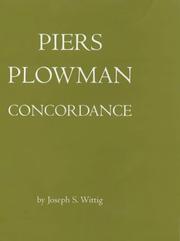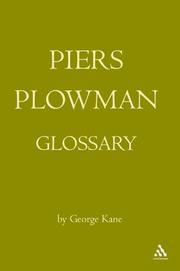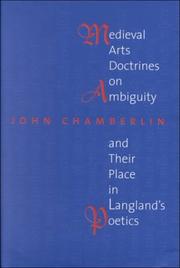| Listing 1 - 10 of 19 | << page >> |
Sort by
|
Book
ISBN: 1443838705 9781443838702 9781443837910 1443837911 Year: 2012 Publisher: Newcastle upon Tyne Cambridge Scholars Publishing
Abstract | Keywords | Export | Availability | Bookmark
 Loading...
Loading...Choose an application
- Reference Manager
- EndNote
- RefWorks (Direct export to RefWorks)
Earthly Honest Things brings together the complete shorter writings of a leading international authority on William Langland. Of A. V. C. Schmidt's recent two-volume Piers Plowman: A Parallel Text Edition, Derek Pearsall has said in Speculum that 'By any standards, it is a monumental achievement ... resolute, patient, deeply learned ... magisterial. ... Schmidt ... is always interesting and writes Other a controlled passion.' Lawrence Warner in The Medieval Review has called this edition 'nothing shor...
Book
ISBN: 1443889709 9781443889704 1443887013 9781443887014 Year: 2016 Publisher: [Place of publication not identified] Cambridge Scholars Publis
Abstract | Keywords | Export | Availability | Bookmark
 Loading...
Loading...Choose an application
- Reference Manager
- EndNote
- RefWorks (Direct export to RefWorks)
What do we mean when we talk about the text of Piers Plowman? What is the concept of a literary text when that construct exists in so many variant and feral forms, as is the case for the multiple modern editorial reconstructions and the more than fifty surviving manuscripts and early print editions of Piers Plowman? How do the anonymous roles of author, scribe, and reader intersect to create the experience of the text? How can we judge a pre-modern text's reception history if we do not know exactly what it was that the early reader was responding to?This book takes a daring and innovative appr

ISBN: 1281291919 9786611291914 184714361X 9781847143617 9780485115451 048511545X 9781281291912 6611291911 Year: 2001 Publisher: London New York Athlone Press
Abstract | Keywords | Export | Availability | Bookmark
 Loading...
Loading...Choose an application
- Reference Manager
- EndNote
- RefWorks (Direct export to RefWorks)
This is a complete Concordance to the A, B and C texts of Piers Plowman in the Athlone Press editions. Each word in the vocabulary of the three versions (approximately 5,400) is listed alphabetically in its order of occurrence within the particular version, in the succession A, B, C. Except for a few words of extremely frequent occurrence such as the definite and indefinite articles, common conjunctions and the personal pronouns (all these are indexed) each occurrence of each word is listed within its line of context. Words of similar spelling are, where called for, lexicographically distingui
English language --- Langland, William, --- Germanic languages
Book
Year: 2017 Publisher: Paris : Éditions de la Sorbonne,
Abstract | Keywords | Export | Availability | Bookmark
 Loading...
Loading...Choose an application
- Reference Manager
- EndNote
- RefWorks (Direct export to RefWorks)
Dans les derniers siècles du Moyen Âge, l'Angleterre a connu des transformations essentielles, à la fois culturelles, politiques et sociales. Elles apparaissent dans toute leur complexité au sein de la production poétique contemporaine, qui a constitué durant cette période un médium de communication fondamental. Ainsi, l'objet de cette étude est-il l'analyse des interactions entre ces différentes transformations et un corpus de poèmes allitératifs composés en anglais dans le courant du XIVe siècle (dont le représentant le plus illustre est le Piers Plowman de William Langland). Il s'agit notamment de dégager toute la richesse de textes littéraires qui doivent être considérés comme des sources historiques à part entière. L'auteur s'attache tout d'abord à replacer ces textes dans leur cadre social et culturel, avant d'analyser leur diffusion. Elle envisage ensuite les nombreux thèmes abordés dans les poèmes, qui montrent les multiples intérêts des poètes : l'organisation de la société, le gouvernement et la justice, l'institution ecclésiastique et la connaissance, la perception du salut de chacun et de tous, la conscience que les auteurs avaient de leur activité littéraire. Les critiques de ces derniers, mais aussi leurs propositions et leurs espoirs, reflètent et enrichissent un dialogue de plus en plus large au sein de la société anglaise.
Civilization, Medieval, in literature. --- Langland, William,
Book
ISBN: 9781487515386 1487515383 148750246X 9781487502461 1487515391 Year: 2019 Publisher: Toronto : University of Toronto Press,
Abstract | Keywords | Export | Availability | Bookmark
 Loading...
Loading...Choose an application
- Reference Manager
- EndNote
- RefWorks (Direct export to RefWorks)
"It is a medieval truism that the poet meddles with words, the lawyer with the world. But are the poet's words and the lawyer's world really so far apart? To what extent does the art of making poems share in the craft of making laws, and vice versa? Framed by such questions, Piers Plowman and the Reinvention of Church Law in the Late Middle Ages examines the mutually productive interaction between literary and legal "makyngs" in England's great Middle English poem by William Langland. Focusing on Piers Plowman's preoccupation with wrongdoing in the B and C versions, Arvind Thomas examines the versions' representations of trials, confessions, restitutions, penalties, and pardons. Thomas explores how the "literary" informs and transforms the "legal" until they finally cannot be separated. Thomas shows how the poem's narrative voice, metaphor, syntax and style not only reflect but also act upon properties of canon law, such as penitential procedures and authoritative maxims. Langland's mobilization of juridical concepts, Thomas insists, not only engenders a poetics informed by canonist thought but also expresses an alternative vision of canon law from that proposed by medieval jurists and today's medievalists."--
Christian poetry, English (Middle) --- History and criticism. --- allegory. --- church. --- law. --- legal. --- literature. --- maxim. --- penance. --- Langland, William, --- Piers Plowman (Langland, William) --- Piers the Plowman (Langland, William) --- Piers the Ploughman (Langland, William) --- William Langland's Piers Plowman (Langland, William) --- Vision of William concerning Piers the Plowman (Langland, William) --- Visio Willī de Petro Plouhman (Langland, William) --- Vision and creed of Piers Ploughman (Langland, William) --- Vision of Piers Plowman (Langland, William) --- Vision of Piers the Plowman (Langland, William)

ISBN: 1281294918 9786611294915 1847143792 9781847143792 9780826486028 0826486029 0826486029 Year: 2005 Publisher: London New York Continuum
Abstract | Keywords | Export | Availability | Bookmark
 Loading...
Loading...Choose an application
- Reference Manager
- EndNote
- RefWorks (Direct export to RefWorks)
This Glossary is designed as a companion to William Langland's dream vision poem, Piers Plowman, widely regarded as the greatest literary work in Middle English before Chaucer. It glosses and explains over 5000 English words, and foreign words used as if English, in the A, B and C texts of Piers Plowman printed in the critically-acclaimed Athlone editions. Where possible, it illustrates words with examples from all three versions.The first glossary to Piers Plowman was compiled in 1886 by Sir William Skeat but there has been no attempt, until now, to provide a new glossary that takes account o
Langland, William, --- Langland, Robert, --- Langland, Uĭli︠a︡m, --- Language
Book
ISBN: 0268101655 0268101647 Year: 2017 Publisher: Notre Dame, Indiana : University of Notre Dame Press,
Abstract | Keywords | Export | Availability | Bookmark
 Loading...
Loading...Choose an application
- Reference Manager
- EndNote
- RefWorks (Direct export to RefWorks)
"In this book, Curtis Gruenler proposes that the concept of the enigmatic, latent in a wide range of medieval thinking about literature, can help us better understand in medieval terms much of the era's most enduring literature, from the riddles of the Anglo-Saxon bishop Aldhelm to the great vernacular works of Dante, Chaucer, Julian of Norwich, and, above all, Langland's Piers Plowman. Riddles, rhetoric, and theology--the three fields of meaning of aenigma in medieval Latin--map a way of thinking about reading and writing obscure literature that was widely shared across the Middle Ages. The poetics of enigma links inquiry about language by theologians with theologically ambitious literature. Each sense of enigma brings out an aspect of this poetics. The playfulness of riddling, both oral and literate, was joined to a Christian vision of literature by Aldhelm and the Old English riddles of the Exeter Book. Defined in rhetoric as an obscure allegory, enigma was condemned by classical authorities but resurrected under the influence of Augustine as an aid to contemplation. Its theological significance follows from a favorite biblical verse among medieval theologians, "We see now through a mirror in an enigma, then face to face" (1 Cor. 13:12). Along with other examples of the poetics of enigma, Piers Plowman can be seen as a culmination of centuries of reflection on the importance of obscure language for knowing and participating in endless mysteries of divinity and humanity and a bridge to the importance of the enigmatic in modern literature. This book will be especially useful for scholars and undergraduate students interested in medieval European literature, literary theory, and contemplative theology"--
Ambiguity in literature. --- Riddles in literature. --- Poetics --- Aesthetics, Medieval. --- History --- Langland, William, --- Aesthetics.
Book
ISBN: 0713157445 0713157453 071315750X 9780713157444 9780713157451 Year: 1974 Publisher: London: Edward Arnold,
Abstract | Keywords | Export | Availability | Bookmark
 Loading...
Loading...Choose an application
- Reference Manager
- EndNote
- RefWorks (Direct export to RefWorks)
Poésie anglaise --- --XIVe s., --- Langland, William, --- English poetry --- -English literature --- Chaucer, Geoffrey --- -Contemporaries --- -Chaucer, Geoffrey --- Chaucer, Geoffrey, --- Contemporaries. --- XIVe s., 1301-1400 --- Langland, William, - 1330?-1400? - Piers Plowman --- Piers plowman --- Sir gawain and the green knight --- Sir orfeo
Book
ISBN: 0268074844 0268158002 0268020469 0268204128 9780268158002 9780268020460 Year: 2015 Publisher: Notre Dame, Ind. University of Notre Dame Press
Abstract | Keywords | Export | Availability | Bookmark
 Loading...
Loading...Choose an application
- Reference Manager
- EndNote
- RefWorks (Direct export to RefWorks)
"In Beyond Reformation? An Essay on William Langland's Piers Plowman and the End of Constantinian Christianity, David Aers presents a sustained and profound close reading of the final version of William Langland's Piers Plowman, the most searching Christian poem of the Middle Ages in English. His reading, most unusually, seeks to explore the relations of Langland's poem to both medieval and early modern reformations together with the ending of Constantinian Christianity. Aers concentrates on Langland's extraordinarily rich ecclesiastic politics and on his account of Christian virtues and the struggles of Conscience to discern how to go on in his often baffling culture. The poem's complex allegory engages with most institutions and forms of life. In doing so, it explores moral languages and their relations to current practices and social tendencies. Langland's vision conveys a strange sense that in his historical moment some moral concepts were being transformed and some traditions the author cherished were becoming unintelligible. Beyond Reformation? seeks to show how Langland grasped subtle shifts that were difficult to discern in the fourteenth century but were to become forces with a powerful future in shaping Western Christianity" --
Christian poetry, English (Middle) --- Literature and society --- Religious thought --- Religion and culture. --- Culture and religion --- Culture --- Church history --- Theology, Doctrinal --- History and criticism. --- History --- Langland, William, --- Christian spirituality --- Langland, William

ISBN: 1282858777 9786612858772 0773568581 9780773568587 0773520732 9780773520738 Year: 2000 Publisher: Montreal ; Ithaca, [N.Y.] : McGill-Queen's University Press,
Abstract | Keywords | Export | Availability | Bookmark
 Loading...
Loading...Choose an application
- Reference Manager
- EndNote
- RefWorks (Direct export to RefWorks)
Chamberlin's focal point for this synthesis is the concept of ambiguity, which has played an important role in the liberal arts tradition and in medieval discourses regarding reading and preaching - discourses that are fundamental to Langland's poetic ways with words. His work takes its place among other recent attempts to retrieve medieval literary theory, making it possible for it to inform the reading of medieval literature, but places this theory within a particularly wide context. Chamberlin claims that the excess of meaning ambiguity gives language is at least as important to the understanding of Piers Plowman and other medieval texts as is allegory. He deals with lexical ambiguity and the ambiguity of words-as-words - in which words themselves are taken as objects - offering linguistic, philosophical, and historical perspectives on these subjects. How ambiguity works in Langland's poetry is explained in close analysis of a number of passages from the poem. Chamberlin's overview of the historical development of the concept of ambiguity pays special attention to the doctrines of Augustine and the twelfth-century masters. He elucidates these by reference to similar ideas from Romantic and twentieth-century theorists, providing a coherent view of language that stands as an alternative to structuralist and post-structuralist views.
Ambiguity in literature. --- Poetics --- History --- Aesthetics, Medieval. --- Langland, William, --- Aesthetics. --- Medieval aesthetics --- Langland, Robert, --- Langland, Uĭli︠a︡m,
| Listing 1 - 10 of 19 | << page >> |
Sort by
|

 Search
Search Feedback
Feedback About UniCat
About UniCat  Help
Help News
News